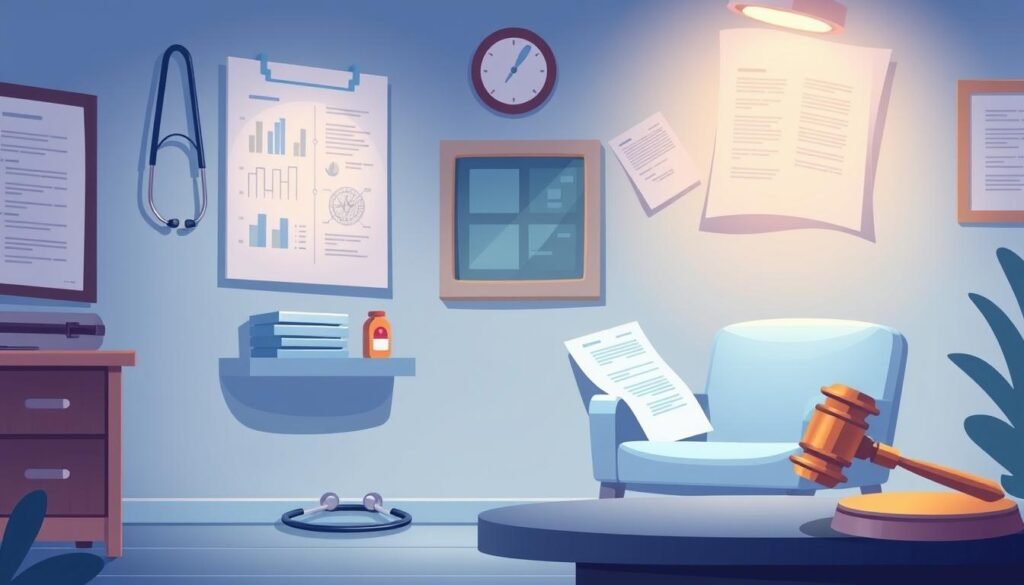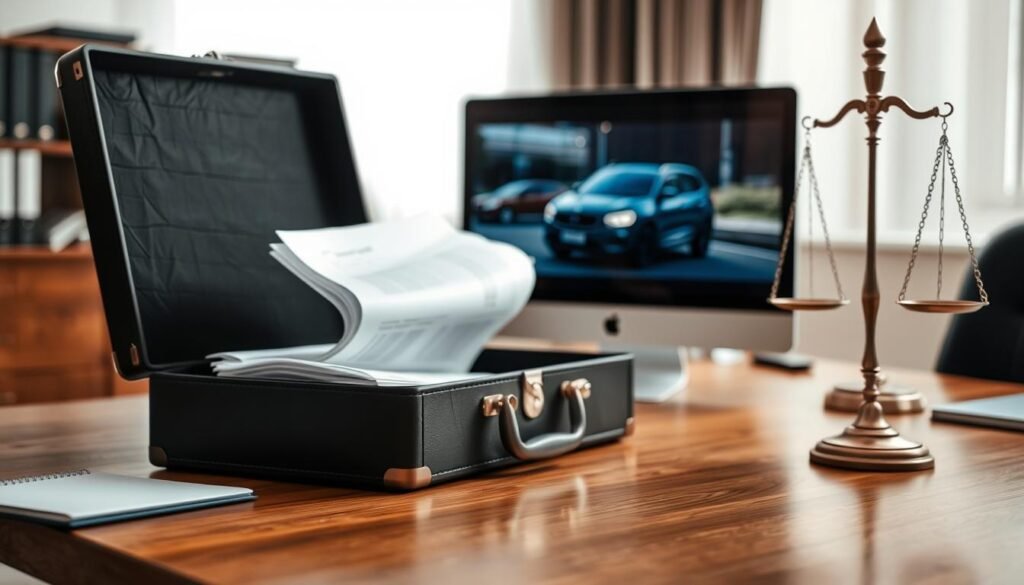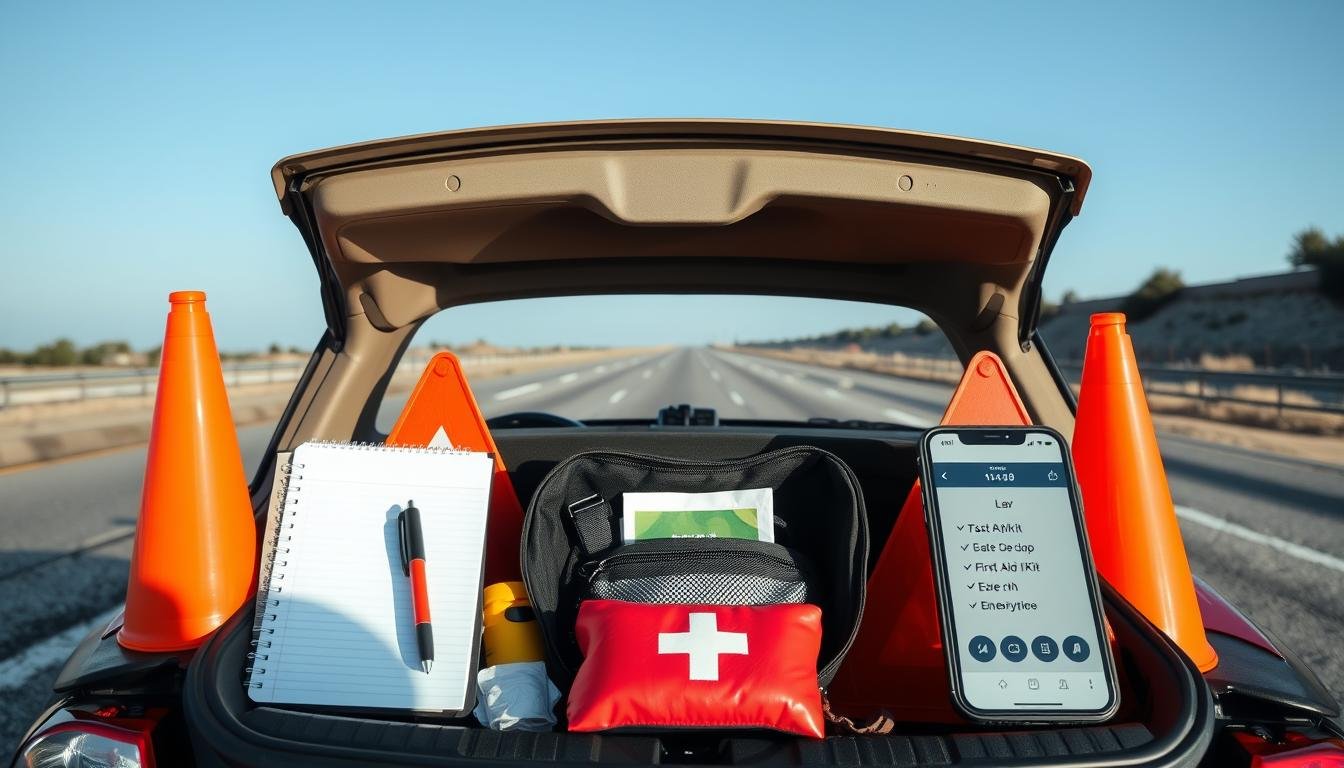Did you know that more than 3 million people in the United States are injured in car accidents every year? This staggering figure underscores the critical need for preparedness in such unforeseen events. Familiarity with your legal rights and the implementation of a strategic plan can profoundly influence your response to a collision. Adopting a proactive stance, rather than a reactive one, is paramount in navigating the intricate realm of car accident legal advice. This approach empowers you to manage a potentially stressful situation effectively. In this article, we delve into vital steps and insights, ensuring you are well-versed in protecting your interests and well-being in the event of an accident.
Key Takeaways
- Understanding your legal rights is crucial after a car accident.
- Proactive preparation can significantly ease the stress of dealing with accidents.
- Gather all necessary information immediately after an accident.
- Documenting the scene is essential for any claims or legal processes.
- Seeking legal advice early can help guide your decisions.
Understanding Your Legal Rights After an Accident
Post-accident, grasping your legal entitlements is paramount for equitable treatment from insurers and other stakeholders. Engaging legal counsel is crucial, profoundly influencing your recovery trajectory. Familiarizing yourself with available resources and adeptly navigating the accident’s aftermath is imperative.
The Importance of Legal Representation
Engaging a seasoned attorney is invaluable in managing intricate insurance claims and personal injury litigation. Legal counsel affords access to specialized guidance, ensuring you are apprised of your rights post-accident. They facilitate the construction of a robust case, provide a candid evaluation of your circumstances, and advocate on your behalf. Their acumen is indispensable in deciphering policy nuances, thereby ensuring you receive all due benefits.
Types of Compensation You May Be Entitled To
Victims of vehicular mishaps may be eligible for various forms of compensation. Familiarity with potential entitlements empowers your progression. Compensation encompasses:
- Medical expenses – Coverage for hospital bills, therapy sessions, or ongoing care.
- Lost wages – Reimbursement for earnings lost due to recovery times.
- Pain and suffering – Compensation for physical discomfort and emotional distress.
These represent but a fraction of potential compensation avenues. Acquainting yourself with your legal rights and exploring post-accident legal strategies can greatly facilitate your recovery.
What to Do Immediately After an Accident
Experiencing a car accident necessitates immediate action to ensure safety and facilitate legal procedures. Prompt responses can significantly influence the outcome. First and foremost, verify the safety and security of all individuals involved.
Ensure Safety First
Ensure the safety of all parties. If feasible, relocate vehicles from the traffic path to avert additional collisions. Activate your hazard lights to signal other drivers. In cases of injuries, summon medical assistance without delay.
Gather Necessary Information
Accumulate critical details from all participants in the accident. Key information includes:
- Names and contact information
- Insurance company names and policy numbers
- Vehicle makes, models, and license plate numbers
This data is indispensable for any subsequent claims. For a comprehensive guide, consult the steps to take in a car accident scenario.
Notification of Authorities
Notify the appropriate authorities to report the incident. This step is crucial for documenting the event and obtaining an official report, essential for claims processing. The police will evaluate the scene and gather statements from participants. This documentation is pivotal in navigating the legal aftermath of a car accident.
Documenting the Accident Scene
Effectively documenting the accident scene is crucial for your case. Collecting concrete evidence solidifies your position and supports your claims. Legal tips after a car accident highlight the importance of taking comprehensive photos and videos, collecting witness statements, and creating a detailed report.
Taking Photos and Videos
Utilize your smartphone or camera to capture images and videos of the accident scene. Focus on:
- The positions of vehicles involved
- Visible damages to each vehicle
- The surrounding area, including any road signs or signals
These visual aids serve as critical evidence for your insurance claims or any legal action you may pursue. For more details on how to document the scene, consider visiting this resource.
Collecting Witness Statements
Eyewitnesses can provide essential input into the circumstances of the accident. Approach any bystanders and ask for their insights. Take notes or record their statements with consent, including:
- Their names and contact information
- A description of what they observed
- Their impressions of the incident
Having multiple viewpoints can validate your case and assist your legal team in providing car accident legal help when pursuing compensation.
Creating a Detailed Accident Report
Compile a thorough report that includes all collected data and observations. Document key details such as:
- Date and time of the accident
- Location of the incident
- Weather conditions during the crash
- Involvement of any law enforcement or emergency services
A well-structured accident report serves as a crucial reference for potential legal proceedings and insurance negotiations. By taking these steps, you ensure you are better equipped when seeking legal tips after a car accident.
Insurance Considerations: What You Should Know
Understanding the intricacies of insurance post-car accident can be daunting. Familiarity with coverage types—liability, collision, and comprehensive—is crucial for grasping claimable options. Proactive measures are key to a less complicated process.
Understanding Your Coverage
An in-depth review of your policy is paramount for dealing with insurance after a car accident. It is imperative to comprehend the various coverage options and their implications for your scenario. Awareness of policy limits can avert unforeseen financial burdens post-accident.
Reporting the Accident to Your Insurer
Timely notification of the accident to your insurer is critical. Insurance companies often impose strict deadlines for reporting incidents, and tardiness can jeopardize your claim. Accurate and comprehensive communication of incident details is essential for expedited claim processing.
Handling Claims Efficiently
Effective claim management entails prompt submission of required documentation and maintaining continuous dialogue with your insurer. Document all interactions regarding your claim. Such diligence is vital for upholding your car accident legal rights and ensuring prompt claim resolution.
The Role of Police in Car Accidents
The role of police at accident scenes is critical for several reasons. Their involvement is crucial in managing the aftermath effectively. Their official reports and observations significantly impact the legal steps following a car accident. It is essential to comprehend how their role influences the entire process.
When to Call the Police
There are various scenarios where calling the police is necessary, including:
- If there are any injuries involved.
- When significant property damage occurs.
- If one or more parties appear uncooperative.
Deciding to summon the police ensures safety and creates an official record. This record is vital for your car accident legal help.
Getting a Copy of the Police Report
Obtaining a copy of the police report post-incident is a priority. This document serves as the official account of the accident. It documents crucial details that can assist in your case. Having this record clarifies facts, especially when dealing with insurance companies or potential legal actions.
The Impact of Police Findings on Claims
The findings in the police report significantly influence your claims process. Insurance negotiations often rely on this documentation. Disputes related to fault become clearer through the police’s objective observations. This reinforces the importance of following proper legal steps after a car accident. Understanding the implications of the police findings aids in navigating the complexities of your case more effectively.
Seeking Medical Attention After an Accident

After a car accident, prioritizing personal health is paramount. Immediate medical attention is crucial for both your well-being and legal rights. It helps uncover injuries that may not immediately show symptoms. This proactive step is essential for protecting your legal interests.
Importance of Immediate Health Assessment
Many underestimate the necessity of immediate health assessments post-accident. Even minor injuries can hide more severe conditions like concussions or internal injuries. Consulting a healthcare professional ensures all injuries are documented, which is crucial for your legal rights.
Documenting Medical Treatment
It is vital to meticulously record all medical treatments. Document every healthcare visit, diagnosis, and treatment. This documentation links your injuries to the accident, strengthening your compensation claim. Remember to request copies of all medical reports and bills.
Understanding Medical Bills and Claims
Understanding your medical expenses is crucial during the claims process. Organize all bills and ensure they accurately reflect the treatments received. Your medical bills will support your claim for reimbursement. A detailed account of expenses clarifies the accident’s financial impact, aiding in asserting your legal rights.
Dealing with Insurance Adjusters
Engaging with insurance adjusters post-car accident can be daunting. Effective communication is paramount to ensure your claims are processed correctly. Clearly articulating your situation can significantly influence your claim’s outcome.
How to Communicate Effectively
When discussing the accident and damages, be direct and to the point. Focus on verifiable facts, eschewing extraneous details that might obfuscate the issue. Such clarity facilitates a more efficient claims process and fortifies your compensation claim.
What Not to Say
When conversing with an adjuster, refrain from admitting fault or speculating about injuries. Statements like “I think I might be hurt” can undermine your case. Instead, maintain a professional stance and provide precise, relevant information about the incident.
Understanding Settlement Offers
Initial settlement offers from adjusters often undervalue your damages. It is essential to review these offers with legal counsel to grasp your entitlements fully. A strategic negotiation can substantially enhance your financial recovery post-accident.
Common Legal Challenges After an Accident
Encountering a car accident can be overwhelming, especially when delving into the legal aftermath. Grasping potential hurdles beforehand is crucial for safeguarding your rights. Below are pivotal considerations that may emerge post-accident.
Understanding Comparative Negligence
Comparative negligence laws vary by state, influencing how fault is assessed in accidents. In certain areas, if you share fault, your compensation could be diminished according to your liability percentage. Acquainting yourself with these regulations is vital for legal tips after a car accident. It ensures you receive the rightful compensation.
Navigating Fault and Liability
Identifying fault can be intricate. Insurers and legal advisors meticulously analyze the accident to determine liability. Being aware of your rights and obligations is crucial. Maintaining detailed records and engaging actively with your insurer is key to defending your rights.
Dealing with Uninsured Motorists
Regrettably, encounters with uninsured drivers are common. In such cases, understanding your insurance policy is paramount. Some policies include uninsured motorist coverage, safeguarding you financially. Thoroughly examining your policy is essential for effectively addressing this issue.
Filing a Personal Injury Claim
Understanding when to file a personal injury claim is crucial for safeguarding your rights following a car accident. This step may be necessary when damages exceed insurance coverage or when liable parties fail to offer a fair settlement. Recognizing significant injuries or financial losses is a clear indicator for legal action.
When to Consider Legal Action
Exploring legal options is vital if you’ve suffered serious injuries or incurred substantial property damage. Victims often face overwhelming medical bills and emotional distress post-accident. Timely action is essential to protect your rights and secure appropriate compensation.
The Process of Filing a Claim
The process involves several critical steps. First, collect all relevant evidence, including medical records, accident reports, and witness statements. Next, prepare legal documents, which may necessitate professional assistance. Proper documentation is crucial for establishing your case, underscoring the importance of understanding your legal rights.
Statute of Limitations to Keep in Mind
Each state has a statute of limitations that dictates the timeframe for filing a claim. Failing to meet these deadlines can severely limit your ability to claim damages. Being aware of these time constraints emphasizes the urgency of addressing your situation promptly after an accident.
Mediation and Settlement Options
Resolving a car accident aftermath can be daunting. Mediation emerges as a viable solution, enabling parties to discuss claims outside court. It fosters dialogue and strives for a consensus, appealing to those seeking legal assistance post-accident.
Exploring Alternative Dispute Resolution
Alternative dispute resolution (ADR) methods, like mediation, streamline the recovery process. ADR employs a neutral third party to guide negotiations. This method can expedite resolutions, alleviating the anxiety of prolonged legal battles. Legal advice often highlights mediation’s benefits, suggesting its early consideration.
Pros and Cons of Settling Outside Court
Mediation’s advantages must be balanced against its potential drawbacks. The benefits include:
- Reduces legal expenses and court costs.
- Creates a collaborative negotiation environment.
- Promotes quicker settlements.
However, there are also considerations:
- It may necessitate concessions.
- The agreement might be less than a court award.
- Settlements are typically non-negotiable once agreed.
Grasping the implications of these choices is crucial for those dealing with a car accident’s aftermath. Informed decisions significantly influence claim outcomes.
Preparing for Court: What to Expect
Advancing to court necessitates a deep understanding of court procedures. Acquainting yourself with the legal terrain can mitigate the anxiety inherent in litigation. By anticipating the court’s protocols, you can concentrate on your case and assert your rights more effectively.
Understanding Court Procedures
It is crucial to familiarize yourself with the steps involved in court proceedings. The process generally encompasses:
- Entry of your case into the court system.
- Pre-trial conferences to outline issues and evidence.
- The trial itself, where evidence and testimonies are presented.
Gathering Relevant Documentation
Collecting necessary documentation is pivotal in supporting your claims. Consider gathering:
- Accident reports from local law enforcement.
- Medical records detailing injuries sustained.
- Communications with insurance companies and other parties involved.
These legal steps after a car accident can substantiate your arguments and strengthen your position during the trial.
Tips for Testifying
Testifying in court may feel intimidating, yet with preparation, you can present your case confidently. Here are some helpful tips:
- Practice your testimony, ensuring you know key points well.
- Familiarize yourself with potential questions the opposing side might ask.
- Stay calm and composed while answering questions, and take your time.
Being well-prepared enhances your ability to articulate your car accident legal rights, making a significant difference in the outcome of your case.
Working with a Personal Injury Attorney

Choosing the appropriate personal injury attorney is paramount following a car accident. It’s essential to consider several factors that will guide your decision. Look for attorneys with a proven track record in cases similar to yours. Additionally, assess how well you connect with them. Effective communication is key to a smoother experience during this difficult time.
How to Choose the Right Attorney
In your quest for car accident legal help, follow these steps:
- Examine their past cases and results.
- Peruse reviews and testimonials from previous clients.
- Arrange consultations to assess compatibility.
- Ask about their knowledge of local laws and regulations.
Choosing the right attorney significantly influences the quality of car accident legal advice you receive. This, in turn, affects your ability to navigate legal complexities effectively.
The Benefits of Legal Expertise
A seasoned personal injury attorney offers numerous benefits. Here are some advantages you can anticipate:
- They employ expert negotiation tactics to potentially secure better settlements.
- They possess a deep understanding of legal procedures, reducing the likelihood of errors.
- They develop a focused strategy that aligns with your needs and objectives.
By making an informed choice, you empower yourself to secure the compensation you deserve. This process also simplifies the legal complexities involved. For additional guidance, explore this resource on preparing for your initial consultation with an attorney.
Important Considerations for Future Prevention
Enhancing road safety necessitates proactive measures. Understanding preventive measures and techniques is crucial. Defensive driving strategies significantly reduce accident risks.
Defensive Driving Techniques
Defensive driving techniques are paramount for road safety. These include:
- Maintaining a safe following distance.
- Scanning your surroundings regularly.
- Anticipating potential hazards.
Practicing these methods aids in avoiding unexpected situations. For a comprehensive guide on defensive driving, consider reviewing relevant resources that provide valuable legal tips to keep in mind.
Understanding Safe Driving Practices
Incorporating safe driving practices is essential for long-term safety. Key aspects include:
- Adhering to speed limits and traffic signals.
- Avoiding distractions such as smartphones.
- Emphasizing the use of seatbelts for all passengers.
Understanding local laws and regulations enables drivers to make informed decisions. Staying updated on these regulations ensures readiness on the road.
Keeping Yourself Informed
Maintaining knowledge about the latest vehicular technology enhances safety. New safety features and advancements in vehicles can prevent accidents and provide a safer driving experience. Staying informed also helps in knowing how to prepare for a car accident more effectively. Regularly checking trusted sources reinforces the commitment to safe driving.
Conclusion: Stay Prepared and Informed
For those who drive, acquiring car accident legal advice is paramount. Grasping your legal rights profoundly influences your response to a car accident’s aftermath. It is crucial to follow key steps: prioritize safety, collect relevant information, and consult legal experts when necessary. Recapitulating these pivotal legal strategies fortifies your ability to confront any legal hurdles. Adopting a proactive stance, rather than a reactive one, not only facilitates recovery but also establishes a precedent for lawful driving.
Recap of Key Legal Tips
Preparing for a car accident entails understanding your rights and obligations. This includes documenting accident details, accurately reporting to your insurance, and seeking medical care when required. Effectively managing these aspects safeguards your rights and well-being in unexpected situations. Staying abreast of these procedures is essential for being adequately prepared.
Taking Charge of Your Safety on the Road
Ultimately, ensuring your safety requires more than just knowing what to do in an accident. It involves practicing defensive driving and maintaining vigilance on the road. By adopting these strategies, you enhance your safety and contribute to a safer driving environment for all.
